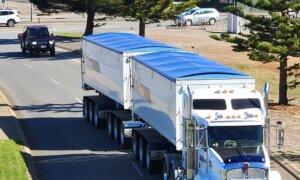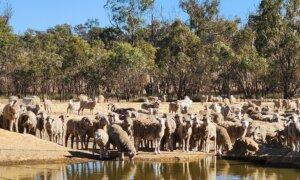Farmers in WA Sound Alarm Over Potential Multi-Million Dollar Losses Due to Live Sheep Export Ban
‘This will absolutely decimate—and I’m not using that word lightly—regional Western Australia.’
The shutting down of live sheep export by the Albanese government will have significant financial implications for rural communities in Western Australia over the next decade, as warned by a farmer advocacy group.
The industry suffered a blow to its reputation in 2018 when Perth-based ship operator Emanuel Exports faced animal cruelty charges after about 2,400 sheep died onboard the Awassi Express. Although the charges were dropped later, the trade never fully recovered from the negative publicity.
WA Farmers President John Hassell expressed concerns that the government’s decision to phase out live sheep exports would have adverse effects on regional economies, jeopardizing job security for many sheep-rearing families.
“This will absolutely decimate—and I’m not using that word lightly—regional Western Australia,” stated John Hassell to The Epoch Times.
NEWROC represents seven local government areas including Dowerin, Koorda, Mt Marshall, Mukinbudin, Nungarin, Trayning, and Wyalkatchem.
“It’s a significant financial impact,” remarked Mr. Hassell.
The analysis revealed that the live sheep export industry contributes $52 million of value-added annually, with a majority of this value coming from Western Australia where the industry directly contributes $45 million to the economy annually.
Can the Sheep Industry Still Thrive?
Agriculture Minister Murray Watt believes that the sheep industry can still prosper without live exports.
“The Australian sheep industry now has the time, support, and certainty it needs to plan effectively for the future,” stated Minister Watt in a media release on May 30.
“All that would change is that the sheep would be processed onshore.”
Minister Watt highlighted the decline in live sheep exports over the past two decades, while noting the increase in chilled and frozen exported Australian sheep meat numbers.
“While live sheep export numbers have drastically reduced in the last 20 years, now contributing just 0.1 percent of all national agricultural exports, sheep meat exports are soaring,” he added.
However, Nationals Senator Matt Canavan criticized the Agriculture Minister for underplaying the impact of the live sheep export ban on farmers, citing a government report indicating that 14 percent of farmers may need to seek new careers.
“The remaining $52 million primarily goes to government departments, agencies, and programs with minimal direct benefits for the industry,” noted the report.
Support for the Ban from Animal Welfare Groups
Animal welfare organizations like Animals Australia lauded the ban, stating that the global live export trade has been based on animal suffering, jeopardizing their welfare during long journeys for meat production in other countries.
Rebecca Linigen from Four Paws Australia agreed, emphasizing how the ban aligns with societal expectations regarding animal treatment, not just in Australia but worldwide.
The Royal Society for the Prevention of Cruelty to Animals (RSPCA) also condemned the live sheep export trade in a media release, citing observer reports indicating issues of animal starvation and heat stress during recent voyages.
Consideration for Animal Welfare and Industry Viability
Although the ban on live sheep exports could potentially impact animal welfare, WA Farmers CEO Trevor Whittington warned that sending higher volumes of sheep to Australia’s east coast could pose more significant challenges from an animal welfare perspective.
Mr. Whittington highlighted the potential adverse effects of increased transportation costs on livestock viability, leading to unprofitable outcomes.
He also raised concerns that activist pressure could extend to shutting down the cattle industry, given the higher mortality rates for cattle during transportation compared to sheep.
Mr. Hassell shared similar apprehensions, indicating that the ban on live sheep exports could establish a concerning precedent for targeting industries based on activist preferences.
He hinted at potential political consequences, stating that sheep farmers in WA may seek a change in government at the next federal election in response to the ban.
On May 30, a protest against the decision drew nearly 3,000 people and numerous livestock trucks to Perth’s CBD.
Efforts to obtain comments from Animals Australia and Minister Watt’s office were made but remained unanswered by the time of publication.





